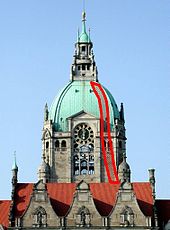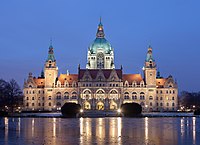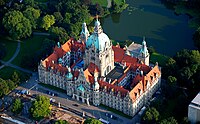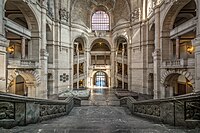New Town Hall (Hanover)
| New Town Hall | |
|---|---|
Neues Rathaus | |
 | |
 | |
| General information | |
| Address | Platz der Menschenrechte 1 |
| Town or city | Hanover |
| Country | Germany |
| Coordinates | 52°22′02″N 9°44′14″E / 52.367249°N 9.737355°E |
| Construction started | 1901 |
| Opened | 1913 |
| Height | 97.73 m (320.6 ft) |
| Technical details | |
| Floor area | 8,700 m2 (94,000 sq ft) |
| Design and construction | |
| Architect(s) | |
The New Town Hall (German: Neues Rathaus) is a town hall in Hanover, Germany. It opened on 20 June 1913 after construction lasting 12 years.[1] A magnificent, castle-like building of the era of Wilhelm II in eclectic style at the southern edge of the inner city just outside the historic city centre of Hanover, the building is embedded within the 10-hectare (25-acre) Maschpark. [de ]
History
[edit]Costing 10 million marks, the New Town Hall was erected on 6,026 beech piles by architects Hermann Eggert and Gustav Halmhuber.[2] "Ten million marks, Your Majesty – and all paid for in cash", the City Director, Heinrich Tramm, [de ; ru ] is claimed to have announced when the New Town Hall was opened in the presence of Emperor Wilhelm II. In honour of Tramm the public space in front of the building was named Trammplatz (lit. 'Tramm Plaza') until 23 September 2024,[3] when it was renamed to Platz der Menschenrechte (lit. 'Human Rights Plaza') because Tramm is recognized as a pioneer of National Socialism.[4]
Upon opening, the New Town Hall replaced the Wangenheim Palace as the main seat of administration, which had moved from the Old Town Hall into the Wangenheim Palace in 1863. As of 2022[update], the New Town Hall is still "the residence of the Mayor and CEO, the head of the municipal administration."[1]
Damaged during bombing raids on the inner city of Hanover in World War II,[5] the German state of Lower Saxony was proclaimed in 1946 in the 38-metre-high (125 ft) hall of the New Town Hall.[1]
There are four city models of Hanover in the ground floor of the New Town Hall.[1] They vividly portray the development of the city.
Dome with elevator
[edit]The dome of the New Town Hall, with its observation platform, is 97.73 metres (320.6 ft) high.[6] The dome's lift is unique in the world in that its arched course follows the parabolic shape of the dome.[1][7] It is often incorrectly described as a sloping lift up the dome and compared with the lifts in the Eiffel Tower, which actually travel diagonally only, without changing their angle of inclination. The lift climbs the 50-metre (160 ft) shaft at an angle of up to 17° to the gallery of the dome, where the Harz mountain range can be seen when visibility is good. In the process, the lift moves 10 metres (33 ft) horizontally. During the trip, the two weight-bearing cables wind up on three double rolls in the wall of the shaft.
The cage of the lift erected in 1913 travelled on steam-bent oak tracks. Because of the weather, this lift was not usable in the colder half of the year. A spiral staircase leads from the lift exit to the observation level. In 2005, over 90,000 people visited the tower of the New Town Hall. A new lift was installed in winter of 2007–08. The last trip of the old lift took place with Lord Mayor Stephan Weil on 4 November 2007. On that weekend, 1200 guests took the last opportunity to ride in the old lift.
Gallery
[edit]-
Hanover's New Town Hall at night
-
Aerial view
-
Interior
General references
[edit]- Steinweg, Wolfgang [in German] (1988). Das Rathaus in Hannover: von der Kaiserzeit bis in die Gegenwart [The Town Hall in Hanover: from the Imperial Era to the Present Day] (in German). Hanover: Schlüter. ISBN 3-87706-287-3. OCLC 18487850.
- Schinkel, Andreas (16 September 2024). "Bröckelnde Kuppel, teure Aufzüge: So kaputt ist das Neue Rathaus Hannover" [Crumbling dome, expensive elevators: This is how broken the New Town Hall in Hanover is]. Hannoversche Allgemeine (in German). Archived from the original on 16 September 2024. Retrieved 16 September 2024.
References
[edit]- ^ a b c d e "The New Town Hall". Visit Hannover. Hannover Marketing und Tourismus GmbH. 8 June 2022. Retrieved 28 August 2022.
- ^ "New Town Hall". Reiseland Niedersachsen. TourismusMarketing Niedersachsen GmbH. 7 December 2017. Retrieved 19 October 2023.
- ^ "Trammplatz wird zum Platz der Menschenrechte". Landeshauptstadt und Region Hannover. 2024. Retrieved 8 November 2024.
- ^ "Drucksache Nr. 15-0877/2024:
Platzumbenennung im Stadtteil Mitte". City of Hanover. 11 April 2024. Retrieved 8 November 2024.
Heinrich Tramm war „Wegbereiter des Nationalsozialismus" in dem Sinne, dass er aktiv gegen die demokratische Republik gearbeitet hat, auch wenn er Mitglied in den demokratisch gewählten Gremien war.
- ^ Franz, Axel (10 April 2018). "Ein Neues Rathaus aus der alten Zeit" [A New Cityhall from Long Ago]. NDR (in German). Norddeutscher Rundfunk. Retrieved 28 August 2022.
- ^ "New Town Hall" (PDF). Hannover.de – Official portal. Hannover Veranstaltungs GmbH. April 2022. Retrieved 19 October 2023.
- ^ "Hannovers prächtiges Rathaus mit Aussicht" [Hanover's Magnificent Town Hall with Views]. Norddeutscher Rundfunk (in German). 11 August 2021. Retrieved 19 October 2023.
Further reading
[edit]- "Das Neue Rathaus" [The New Town Hall]. Visit Hannover (in German). Hannover Marketing und Tourismus GmbH. 15 February 2023. Retrieved 19 October 2023.
External links
[edit]- Webcam with a view of the New City Hall
- 3D model in GoogleEarth 4[dead link]
- New City Hall city panorama - Interactive 360° panorama with New City Hall dome and panoramic view





